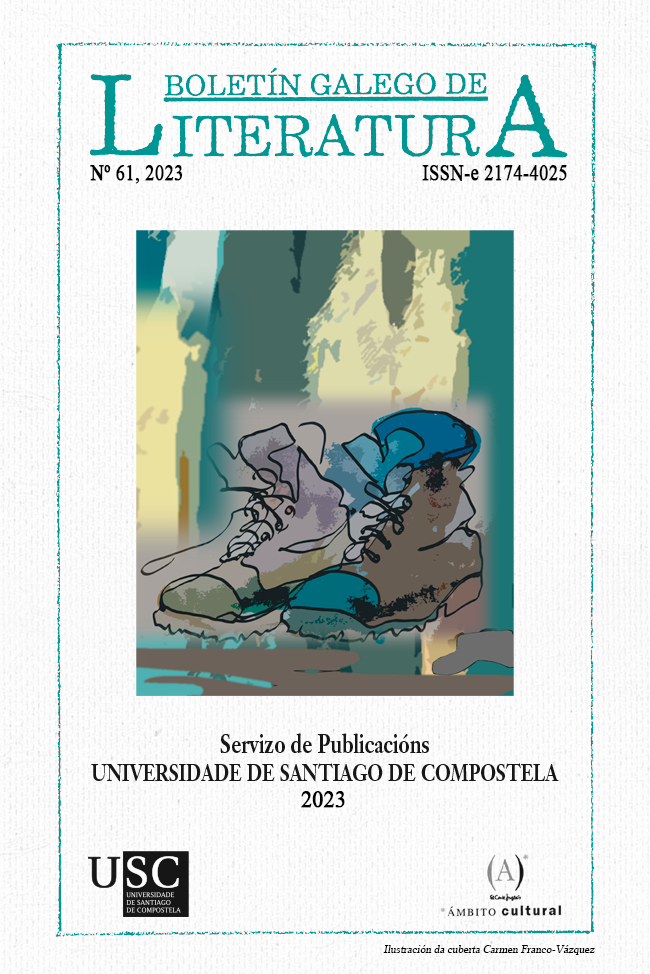New possibilities for interpreting Antón Lopo's poetry thanks to queer theories, ecocriticism and comparatism
Main Article Content
Abstract
Antón Lopo’s poetry meant a totally disruptive approach to the 80’s Galician literary scene due to his intentions to subvert the standards stablished by society in the matters of gender, sexuality or identity, as well as what can and cannot be said on poetry itself. The critical reception to his works until now has tried to interpretate his words and explaining his contents, but we can recognise an apparent lack of analysis tools for the comprehension of queer subjects because of the newness that this kind of products signify to their literary field. Thus, we acknowledge it is necessary to open a new path of (re)interpretation possibilities of his poetry. Moreover, we find ecocriticism and the comparison to the trans Canarian writer Roberta Marrero’s poems to be highly useful in this case, since both of this methods can bring light over some of the gender and identity strategies that we will take into account for our paper.
Keywords:
Article Details
References
Butler, J. (2007). El género en disputa. [M. A. Muñoz, Trad.]. Paidós.
Casanova, P. (2005). Literature as a World. New Left Review, 31, 71-90.
Cochón Otero, I. (2000). A poesía de fin de milenio: O reaxuste dos anos noventa. En A. Tarrío Varela (Coord.), Galicia Literatura (vol. 33) (pp. 364-417). Hércules de Ediciones.
Continta Me Tienes (s.d.). La Editorial. https://contintametienes.com/la-editorial-2/
Cordal, X. (1999). Pronomes, de Antón Lopo. Festa da palabra silenciada, 15, 100-101.
Crisp, Q. (1968). The Naked Civil Servant. Jonathan Cape.
Filgueiras Fachal, P. (2011). De nómades e sedentarios. Desexo e identidade na poesía de Antón Lopo. Boletín Galego de Literatura, 45, 175-195.
Flick (10 de outubro de 2011). Se cumplen veinte años de la muerte de Sonia, la mujer transexual asesinada en Barcelona por un grupo de ultraderechistas. Dos Manzanas. https://acortar.link/aNDCaT
González Fernández, H (1999-2000). Tres argumentos para di/versificar as identidades de xénero: Arden, Pronomes e Lob*s. Lectora: Revista de Dones i Textualitat, 5-6, 89-95.
Kobabe, M. (2022). Género queer. Una autobiografía. Editorial Astronave.
López Penedo, S. (2008). El laberinto queer. La identidad en tiempos del neoliberalismo. Egales.
Lopo, A. (1988). Sucios e desexados. Sotelo Blanco.
Lopo, A. (1998). Pronomes. Espiral Maior.
Marrero, R. (2016). Bebé verde: infancia, transexualidad y héroes del pop. Lunwerg Editores.
Marrero, R. (2020). Poema Flor. En L. Platero (Coord.), (h)amor6 trans, (pp. 81-82). Continta Me Tienes.
Marrero, R. (2022). Todo era por ser fuego. Poemas de chulos, trans y travestis. Continta Me Tienes.
Marrero, R. [Laie] (28 de abril de 2022). Entrevista de Rubén Serrano. #enprivat con Roberta Marrero y Rubén Serrano en Laie CCCB [Arquivo de vídeo]. YouTube. https://youtu.be/2FILxxhxiEg
McGovern, T. (2006). Expressing Desire, Expressing Death: Antón Lopo’s Pronomes and Queer Galician Poetry. Journal of Spanish Cultural Studies, 7(2), 135-153. https://doi.org/10.1080/14636200600811110
Mora, V. (2022). Prólogo: La voz poética y el yo intruso, o la luz de nuestro mundo. En R. Marrero, Todo era por ser fuego. Poemas de chulos, trans y travestis (pp. 9-16). Continta Me Tienes.
Romaní, A. (1998). Arden. Espiral Maior.
Spivak, G. C. (2009). ¿Pueden hablar los subalternos? (M. Asensi Pérez, Trad.). Museu d'Art Contemporani de Barcelona.







